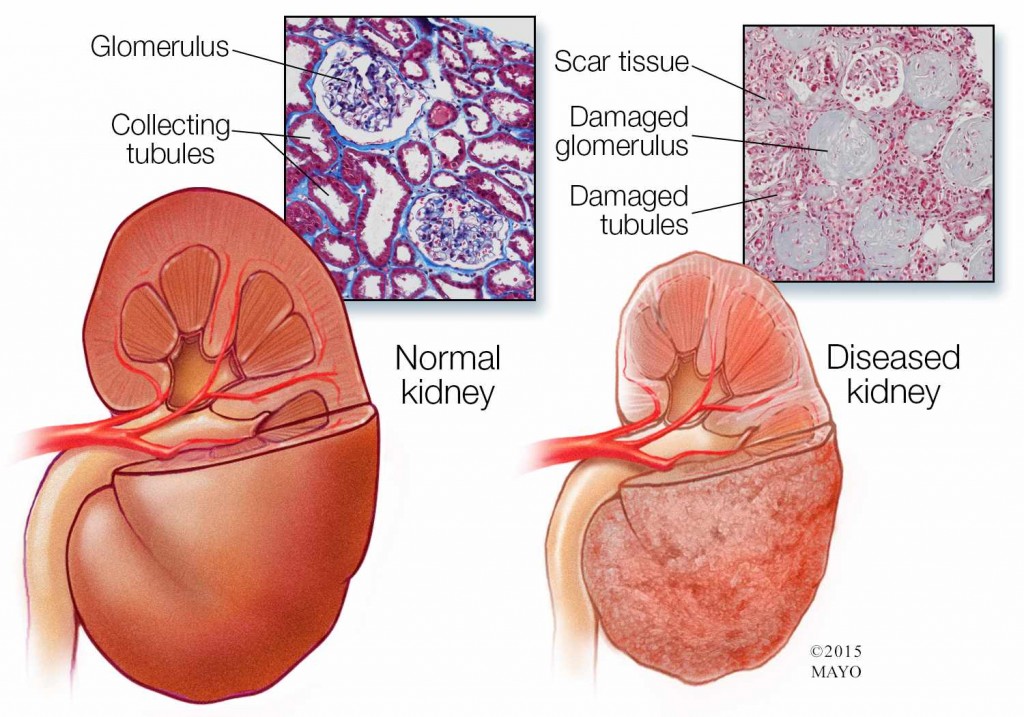-
Minnesota
Mayo Clinic Leads Global Effort to Standardize Diagnosis of Kidney Disease

Consensus report expected to lead to more effective, patient-centered diagnosis and treatment
Rochester, Minn. — Kidney disease is a major health concern worldwide. It’s estimated that 1 in 3 American adults are at risk of developing kidney disease, and 26 million adults already have kidney disease. Many are undiagnosed. Because kidney disease can go undetected until it’s too late, effective and consistent diagnosis is essential. Physicians on Mayo Clinic’s Rochester, Minn., campus – one of the world’s leading kidney disease centers – are at the forefront of an effort to standardize the diagnosis of kidney disease.
In a paper published in the Journal of the American Society of Nephrology (JASN), Mayo Clinic researchers provide a detailed recommendation for standardizing the diagnosis of glomerulonephritis. This is a term used to describe various conditions involving inflammation of the glomeruli, which is the basic filtering unit in the kidneys. Inflammation prevents the kidneys from properly filtering toxins out of the blood and regulating fluid levels in the body, and, ultimately, can lead to permanent damage to the kidneys and potential kidney failure.
MEDIA CONTACT: Ginger Plumbo, Mayo Clinic Public Affairs, 507-284-5005, Email: newsbureau@mayo.edu.
“Earlier this year, we convened renal pathologists and nephrologists from around the world at Mayo Clinic to begin work on an effort that could transform the way kidney disease is diagnosed for patients everywhere,” says Sanjeev Sethi, M.D., Ph.D, professor, Department of Laboratory Medicine and Pathology, Mayo Clinic. “It was time to move the field toward diagnosing glomerulonephritis based on the underlying cause of the disease, which leads to a more personalized diagnosis and more targeted treatment for the patient.”
According to convention, glomerulonephritis historically has been classified by the pattern of inflammation in the glomerulus; however, this does not speak to the underlying cause of the disease. The recommendations published by Mayo Clinic in JASN provide a detailed approach to classifying and reporting glomerulonephritis that is based on pathology and etiology.
“The approach outlined in the consensus paper provides a detailed approach to diagnosing kidney disease that has many advantages for clinicians and patients,” says Fernando Fervenza, M.D., Ph.D., professor, Department of Internal Medicine, Division of Nephrology and Hypertension, Mayo Clinic. “In addition to being focused on the individual patient’s pathology and potential cause of disease, this approach makes the data more adaptable should new diseases be identified by future research. It aligns with database reporting, and it focuses on information that is relevant to the patient and [his or her] potential treatment options.”
Drs. Sethi and Fervenza led the development of the consensus paper, which has been endorsed by the Renal Pathology Society with funding from the Fulk Foundation. The recommendations provided by the consensus report likely will form the basis of how glomerulonephritis is diagnosed and reported worldwide. Based on the recommendations, the kidney biopsy report will be disease and etiology based. This will provide the treating physician a clear pathway toward appropriate testing and evaluation of the underlying kidney disease, followed by correct and specific management of the underlying cause of the glomerulonephritis. The standardized reporting will make it easier for physicians to interpret the kidney biopsy report from various institutions. This is particularly true for Mayo physicians who see patients from different institutions. Thus, based on the etiology-driven kidney biopsy report, a patient visiting Mayo Clinic can be directed to the physician with expertise in the specific area, resulting in targeted, cost effective evaluation, and appropriate treatment of the underlying cause of kidney disease.
About Mayo Clinic
Mayo Clinic is a nonprofit organization committed to medical research and education, and providing expert, whole-person care to everyone who needs healing. For more information, visit http://www.mayoclinic.org/about-mayo-clinic or https://newsnetwork.mayoclinic.org/.







